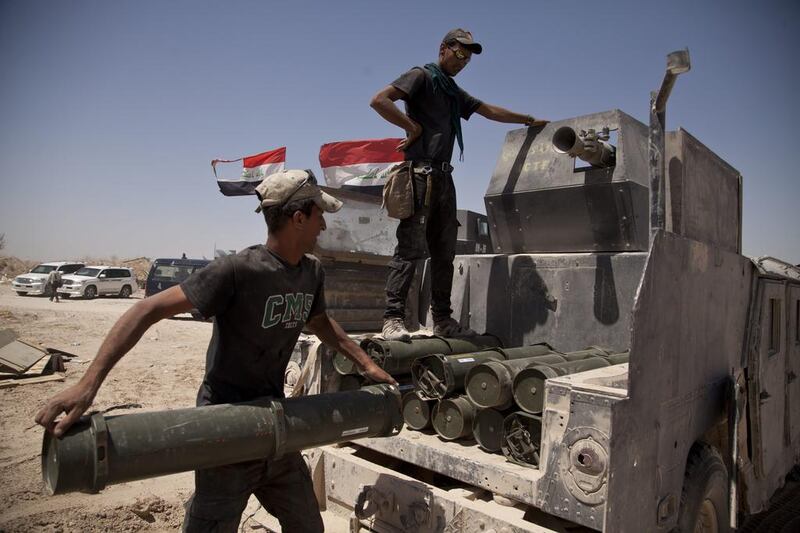BEIRUT // As another hot Ramadan sets in across the deserts of western Iraq and central and eastern Syria, ISIL’s heartland is under threat like no time before in the self-declared caliphate’s nearly two-year existence.
Today, ISIL’s territory spanning the Syrian-Iraqi border is being squeezed by multiple offensives mounted by a patchwork of factions. Villages fall by the day and some of ISIL’s most prized cities – Fallujah and Raqqa – are now being directly threatened.
Ceding territory and trying to stave off sieges, ISIL does not look like the unstoppable behemoth it appeared to be when the terrorist group first captured large chunks of Iraq and Syria in 2013 and 2014.
While the latest moves against ISIL are meeting success, they do not represent a coordinated, unified effort to rout the extremist group from its strongholds.
Rather, they represent competing goals and objectives of factions and their international backers — namely the United States, Russia and Iran.
All are keen to be seen as the key force that crushes ISIL. And all are eager to hold influence over the future of ISIL areas once the group is vanquished. But their battle for power and prestige only complicates the fight against ISIL.
In the last few weeks, a number of major advances have been made against ISIL.
In Iraq, government forces backed by a gathering of primarily Iran-backed Shiite militias began an operation to retake Fallujah, 50 kilometres west of Baghdad, on May 22. Government forces have secured the southern edge of the city and, while fighting continues, ISIL is expected to lose the town.
As Iraqi forces moved on Fallujah, across the border in Syria, US-backed forces – primarily Kurdish fighters of the Syrian Democratic Forces (SDF) – began their own offensive driving south toward ISIL’s de facto capital of Raqqa.
Pressure on ISIL in Raqqa province increased on Saturday as Syrian government forces — bolstered by Russian air strikes — re-entered the province for the first time in nearly two years.
Further west, another SDF offensive has nearly encircled the town of Manbij, a major route for fighters and supplies coming to ISIL from Turkey. On Sunday, the US envoy to the anti-ISIL coalition tweeted that the Manbij offensive had severed ISIL’s main supply route to Raqqa.
-----------------------------------------------------
[ Far from Raqqa and Fallujah, Syria rebels open new front against ISIL in the south ]
-----------------------------------------------------
In all of these theatres, competing powers are trying to force different outcomes.
The arrival of Syrian government forces to Raqqa province has suddenly raised the spectre of a “race to Raqqa” that could force US-backed forces to speed up their plans to take the city and see the simultaneous offensives competing to capture the same targets within Raqqa province.
The SDF offensive has successfully captured villages around Raqqa, but it has also been deliberately slow and limited in scope. Rather than take the city, the offensive was described as an effort to isolate and weaken ISIL forces ahead of an eventual assault on the city.
However, if Syrian government forces get close to Raqqa, the operation’s objectives could change.
Neither the SDF nor their American backers have been eager for an imminent attack on Raqqa. Dominated by the Kurdish YPG militia — which has been accused of forcibly displacing Arabs in parts of Syria and is generally viewed as a fifth column by many pro-rebel Arabs — the SDF forces surrounding Raqqa now are not an ideal force to hold the Arab-majority city.
With Raqqa lying outside the area delineated by Syria’s Kurds as what they want their autonomous region to be, the YPG was unenthusiastic about leading the fight in Raqqa, a city they do not want to control.
Both the US and SDF were believed to buying time to get more Arab fighters on board before launching a full assault on Raqqa.
Depending on its success, the Syrian government’s offensive in Raqqa could change the slow burn plans of the US and SDF.
Already, both the Syrian army and the SDF have their sights set on the airbase of Tabqa, about 50 kilometres west of Raqqa.
-----------------------------------------------------
[ Trapped in Fallujah, thousands of civilians risk becoming collateral damage ]
-----------------------------------------------------
In Fallujah, the US-led coalition has participated in air strikes against ISIL targets, but has likely done so with a grimace due to the scale of Iranian influence over the battle.
While it has been US-trained Iraqi special forces units who have been pencilled in to do the fighting in the city, they are backed by a number of powerful Shiite militias supported by Iran. Tehran has also deployed military advisers to the battle.
It was planned that these militias — which are seen as antagonistic to Fallujah’s Sunni residents — would stay out of the city. But in recent days, there have been growing signs that the militias plan on entering Fallujah.
In the case of the US and Turkey, the latest advances against ISIL even have the capacity to create wedges between powers who are overt allies.
Turkey has been openly hostile toward the YPG militia, the main component of the SDF, which it sees as an extension of its chief domestic enemy, the Kurdistan Workers’ Party. Anger toward the US’s close cooperation with the YPG was exacerbated recently after photos emerged of US special forces operators wearing YPG patches as they assisted the SDF.
Despite being a member of the anti-ISIL coalition, Turkey has largely objected to the YPG’s gains in Syria and sought to limit their expansion even if it means ISIL will remain unchallenged on certain fronts.
Wary that continued YPG gains along Turkey’s border could embolden and eventually help Kurdish separatists at home, Turkey has repeatedly warned the YPG that expansion west of the Euphrates River will not be tolerated.
Now as the SDF pushes a major offensive on Manbij — which lies west of the Euphrates — Kurdish forces are looking to expand their power exactly to where Turkey does not want them.
The US, however, has sought to downplay the role of the Kurds in that offensive, stressing that the operation is being led by Arab forces.
As competing forces jostle to push their own agendas, the fight against ISIL that they have all sworn to is just one part of a larger game for dominance in Syria and Iraq.
jwood@thenational.ae





